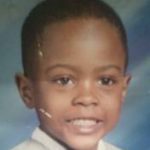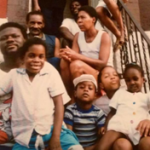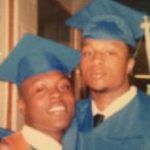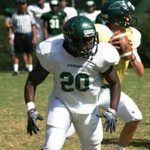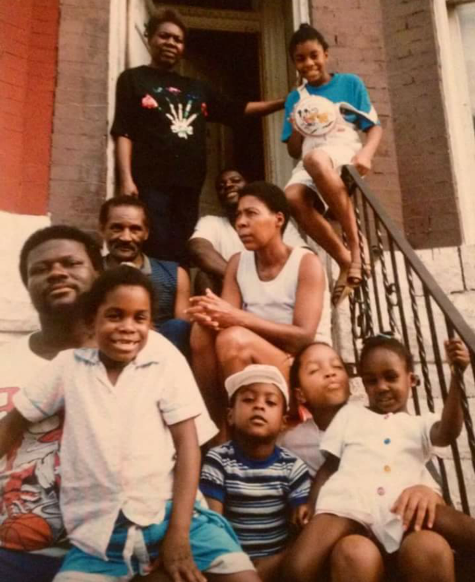It was only a few days later that I was called to the principal’s office. Waiting for me were Assistant Principal Gray and a guidance counselor. I was nervous because I thought I was being kicked out of school. I had been in so many fights that I figured I’d reached the end of the line.
What happened next was almost worse.
“Sadly, I have to inform you that you’re not in high school,” Gray said. “There were some mistakes made and you shouldn’t be here. However, we can’t send you back to middle school.” He kept shaking his head, not quite believing the whole situation. “We have a prep class that you must pass before returning to normal classes. Do you understand?” I didn’t say anything. I was too embarrassed. My biggest weakness, that I still couldn’t read, was being exposed.
They took me to a special room and there sat several other students in the same predicament as me. That, at least, was a relief. The plan for the class was passed out. I figured I’d sit around and this teacher would pass me just like all the others. I know, I know. It was the wrong attitude. But the thing was, even though I had promised myself I wouldn’t fight, I figured I still didn’t have to work in school. As long as I had football, I’d be fine.
The class was like solitary confinement. We stayed in the same room all day and couldn’t even eat lunch with everyone else. I didn’t want people to know I was there, so I kept my head down whenever someone walked by.
At the end of the quarter, I was told that I had failed and that I would have to take the class again. I wasn’t surprised, because I hadn’t done the work. I figured no one else had either and that we’d all play around again. Fuck it.
On the first day of the new quarter I returned to the same room. I’ll never forget it: There’s the same teacher, but there are no other students. I looked around and there was just one desk with a lesson plan on it. For about an hour I thought it was a prank, then I realized I was the only person who had failed. I was so embarrassed. I had always made fun of Special Ed. kids. But this wasn’t even Special Ed., this was below that. I was in shock. My brain just couldn’t even process it. But then I realized the only way to get out was to actually do it. For the first time in my life, a teacher wasn’t going to just pass me.
So I started looking at the packet. And I can’t read it. I recognized a few words—a, but, the—but only the most basic words. It was like looking at ancient runes. I didn’t want to quit so I just stared at it. I could tell they were stories. You had to read the stories, then answer questions about them. It should be easy, but I couldn’t even read the questions. So I sat there all day with this one paragraph, trying to pronounce things, trying to find words I knew, guessing the words around them. I spent the whole day on that one paragraph. I took it home and kept looking at it. I still couldn’t understand it, so I gave it to my younger cousin Solita. She read it, but so easy. As she said each word, I tried to remember it. One word at a time. I knew the words verbally, but I didn’t know what they looked like. Some words, like “ask,” never looked right because I always said “axe.”
Everyday after that, I sat in that classroom, the only student, and struggled. Slowly, my mind started to develop. Soon, I was thinking about language all day, every day. When someone would talk to me, I’d visualize how the word was spelled. I also got my hustle on. I started to tutor younger kids. I was acting like I was their tutor, but I was actually learning from them, pronouncing words, learning to read. It was at Saint Ambrose Family Outreach Center. It was all about attitude. I’d start reading a line and when I got stuck I’d say, “You know what this word is, right?” And if they didn’t know, I made them look it up in the dictionary. That way I learned it, too. It was great, I was learning to read and getting paid $300 a month to do it.
But I was still very slow. It took me hours and hours to complete simple assignments. Something big, like a paper, I would have to start three or four weeks ahead of time. At the end of the quarter I received my report card and I couldn’t believe what I was seeing. All B’s and above! For the first time in my academic life, I was proud of myself.
When I showed my grandmother my report card, she smiled in a way that I had never seen before. Then she started to cry.
I knew I had accomplished something very special: I’d made her feel good, which was the opposite of how I usually made her feel. It was a feedback loop. It made me very happy knowing that I could give her that feeling. And I decided right there that I wanted to do it again.
* * *
By the beginning of sophomore year, I was finally on the right track. Life wasn’t easy, but I now had the tools and the work ethic to succeed. I eventually graduated high school with honors and, after a few of life’s detours, graduated from Stevenson University on May 10, 2014.
It should have been a happy day, after all, I was the first person in my family to graduate from college. But as I looked out at the crowd—at so many “normal” families smiling and taking pictures—I felt the absence of all the people in my life that should have been there and weren’t. By now both my grandparents were dead, and uncle Riccas had joined his brother George in an early death. Most acutely I felt the absence of my best friend Travis who had been murdered earlier that year in a drug-related killing. Yes, I had made it, yet it seemed at a much higher cost than those around me.
As I gazed out at the crowd I remembered back to when I was a child, six years old, hearing gunshots at night and knowing that people were dying; it was my first realization of how dangerous my world was. At that moment, I had no knowledge of the social and economic forces that had created my world, no understanding of poverty or incarceration rates or the probability of an early death. Yet I had still known that I was very small in this world. Now, as an adult, I realize that I’d been right.
I am a product of Baltimore, a city where drugs and poverty and hopelessness make mothers abandon their children. A place where men don’t raise their sons. And where teenage boys murder one another and the paper doesn’t even report it.
But I’m not leaving, even though I now have the tools to do so. I’m still committed to making it a better place. I started with the kids in my neighborhood. I know that I can give them the things that I didn’t have. And if I can help, say, forty kids, then that will have a multiplier effect, sparking something that can grow and grow all by itself.
There is hope, even from the most unlikely of places. After my grandparents died my father didn’t have anywhere to live. Just like I had to learn to read by necessity, he had to get clean if he wanted to survive. He got himself a regular job, an apartment, and a steady girlfriend. I honestly can’t say he never uses, but at least he has it under control. Just a few weeks ago he called me and said he’d been walking by a kids’ football game and had heard some mother shouting encouragement to her son. He told me that he was sorry that he had never done that for me.
I told him not to worry about it.

